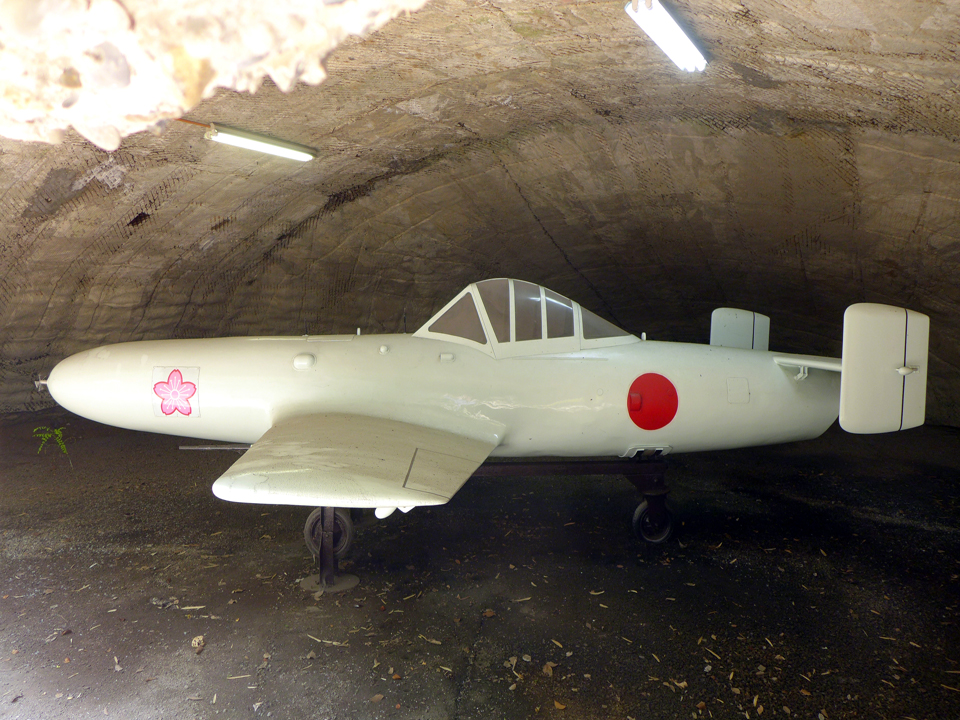Filtered By: Lifestyle
Lifestyle
Japan’s Kamikaze pilots say war horrors lost on young
By SHINGO ITO, Agence France-Presse

This photo taken on August 7, 2014 shows a replica of rocket-powered kamikaze attack plane "Oka," or Cherry Blossom, is displayed at a park beside the ex-Imperial Navy air base in Kashima, Ibaraki prefecture, where Oka's pilots trained. The six-metre (20-foot) aircraft were powered by short-lasting engines that would run just long enough to send them spiralling into enemy ships. Kamikaze pilots—the term means "divine wind"—were heroes in wartime Japan where their deadly sacrifice in the name of Emperor Hirohito and the nation made front-page headlines. AFP PHOTO / TOSHIFUMI KITAMURA
TOKYO - Kamikaze pilot Yutaka Kanbe should have died nearly seven decades ago.
It was only Tokyo's surrender on August 15, 1945, that saved him from the fate of thousands whose suicide missions came to define Japan's unrelenting pursuit of victory in the closing stages of World War II.
But as the 91-year-old faces his own mortality again, he worries that a rightward political shift under Prime Minister Shinzo Abe, and a recent film glorifying Kamikaze missions, are proof that the horrors of war have been lost on generations of younger Japanese.
"It was crazy—I cannot support the idea of glorifying our mission," the former navy pilot said of young men ordered to crash their planes into Allied ships.
"Japan could go to war again if our leaders are all like Abe. I'm going to die soon, but I worry about Japan's future."
"Kamikaze" pilots—the term means "divine wind"—were heroes in wartime Japan where their deadly sacrifice in the name of Emperor Hirohito and the nation made front-page headlines.
The squadrons were formed near the end of the conflict in a desperate effort to prevent an Allied victory. About 4,000 died on missions that sent chills down the spine of many enemy combatants, although most were shot down before reaching their targets.
'Sacrificed their lives'
There are no official figures on the number of surviving Kamikaze pilots and the squadrons have largely faded from memory, with little mention in contemporary school textbooks.
But a film called "The Eternal Zero", based on a best-selling novel, catapulted the squadrons back into the minds of the public earlier this year.
The box-office hit sees a top navy pilot refuse to take part in a suicide mission because he promised his wife that he would return home alive. But the pilot eventually agrees to the death sentence, leaving a comrade to take care of his family.
"I respect Kamikaze pilots—they sacrificed their lives for their families and the country," 18-year-old Tokyo university student Tsurugi Nakamura said after watching the film.
"Kamikaze pilots are cool. It's wrong to criticize the mission," he added.
Kozo Kagawa shares little enthusiasm for that kind of talk.
The 89-year-old former Kamikaze pilot refuses to judge the morality of the missions, but he is still haunted by seeing fellow pilots die in vain. His turn never came.
"It's not for survivors like me to judge whether it was right or wrong. But I'm still mourning the soul of my late buddy. I'm sorry for letting (him) die alone."
A Japanese city's unsuccessful effort to have Kamikaze pilots' farewell letters posted on a United Nations register earlier this year enraged China and South Korea, which suffered from Tokyo's militarism before and during the war.
Relations have been further strained by Abe's bid in July to loosen Japan's pacifist post-war constitution—long a symbol of its peaceful image in much of the world.
The landmark shift to expand the use of Japan's military was met with strong public opposition and warnings it could ultimately see the country dragged into war, amid territorial disputes with Tokyo's neighbors that have stoked fears of an East Asian conflict.
For Kagawa, there is no question that Kamikaze missions were a mistake, but he is less sure about restricting armed forces to a purely self-defense role.
"Kamikaze missions should never happen again, but peace does not come without costs," he said.
"We can't protect peace without defense. Prime Minister Abe appears to be in a hurry to make changes, but I understand what he is trying to do."
'Not a movie'
As the 69th anniversary of the war's end approaches, so too does an annual pilgrimage by Japanese politicians to the Yasukuni war shrine.
The leafy site in downtown Tokyo honors about two million war dead, including Kamikaze pilots, but the inclusion of some top officials convicted of war crimes angers China and South Korea.
Abe stayed away from the pilgrimage last year, but his visit to the shrine in December dragged regional relations to a fresh low, and sparked warnings from Washington over what it saw as an inflammatory gesture.
For supporters, the move amounted to patriotism, while critics say it is further evidence of Abe's flirtations with revisionist history.
Any sugar-coating of Japan's wartime past was misplaced, said Akinori Asano, as he prepares to spend August 15 at home alone, mourning those who never made it back.
The 85-year-old belonged to an infamous force code-named "Cherry Blossom" which aimed single-engine bombers at their targets, derided as "stupid bombers" by the Allies.
The six-meter (20-foot) aircraft were more like flying bombs, powered by short-lasting rocket engines that would run just long enough to send them spiralling into enemy ships.
"It is nonsense to ask why we obeyed orders and why we had to die—there was no room for saying 'no'," Asano said.
"But it was not a movie. I'm afraid young people can't imagine what it was like—all I can do is pray for peace." — Agence france-Presse
More Videos
Most Popular



